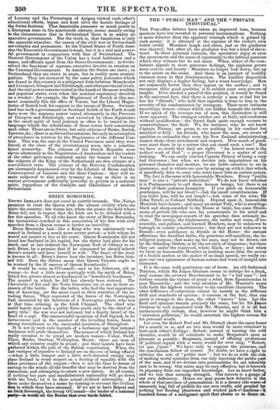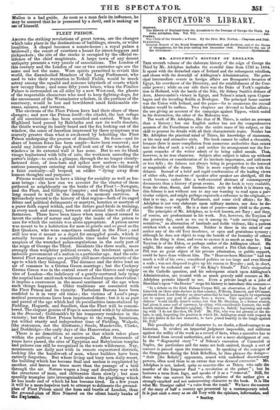THE " PUBLIC MAN " AND THE " PRIVATE INDIVIDUAL."
THE Post-office debates have taken an improved tone, because speakers have less resorted to personal incriminations. Nothing is more delusive than the apparent triumph which is gained by such means : it is obtained at the expense of the victor's own better credit. Members laugh and cheer, just as the gladiator was cheered ; but, after all, the gladiator was but a kind of slave- beast. In these personal contests, the spectators enjoy at once the amusement and the sense of superiority to the inferior passions
which they witness but do not share. When either of the com-
batants appeals to more generous feelings, the applause grows more serious and hearty : Members no longer look down, but up to the actors on the scene. And there is an instinct of worldly common sense in that discrimination. The kindlier disposition not only displays a higher feeling, but a wiser knowledge. Men are commonly better than they appear on the surface ; and to recognize their good qualities, is to exhibit your own powers of insight. If we needed a proof of this position, it would be found in the universal fact, that there is scarcely a man so bad but he has his "friends," who hold that injustice is done to him in the severity of his condemnation by strangers. Their more intimate knowledge detects virtues which are hidden beneath the surface.
If we speak of the average run of men, this distinction is still more apparent. The stranger catches one at fault, and condemns,
without qualification : the friend finds quite enough excuses to counterbalance the fault. We, for instance, who do not know Captain Fitzroy, are prone to see nothing in his conduct but mischief or folly : his friends, who know the man, are aware of qualities so estimable that even his New Zealand administration, cannot shake their attachment and respect. How much of gooa- ness must there be in a nature that can stand such a test 1 But we have no doubt that they are right. "An honest man is the noblest work of God " : a proper Governor is a matter of civil training. We can easily convict Captain Fitzroy of being a vei7 bad Governor ; but when we deviate into imputations on his personal character and motives, we are liable ourselves to err in ignorance, and to vitiate our case by mixing up with it that which is manifestly false to some who must know best on certain points. The fact is the same with honourable Members. Every "public man" is also a "private individual." We do not know whether it is Parliamentary to call them human beings, but there is no
doubt of their common humanity. If you prick an honourable gentleman' will he not bleed 1—Ask the small constituencies. Jf
you tickle him, will he not laugh !—Ask some of the wits.; Sir John Tyrell, or Colonel Sibthorp. Depend upon it, honourable Members have hearts and many an arrant Tory, who is scowling. black and sharp-sworded to the House at large, has some Desde- mona of private life who sees his countenance in his mind and= to read the newspaper-reports of his speeches does seriously in- cline. The erotica, the tendernesses, the smiles and tears, of ho- nourable, and gallant, and learned Members, may be unknown to borough or county constituencies • but they are not unknown to friends—even perchance to friends in the House : the earnest affections, the steadfast faiths, the generous self-sacrifices, the in- telligent purpose, that make up the man, may not be drawn out by the Standing Orders, or by the set style of eloquence ; but there they are under the waistcoat, white, black, or fancy ; and when we treat an honourable Member as nothing more than the mover of a foolish motion or the maker of an inapt speech, we really ex- pose our own ignorance of human nature and want of insight into character.
It is the same with gentlemen out of doors. An old-fashioned Toryism, which Sir James Graham seems to indulge for a freak, may assume the avowed Revolutionist to be "a bad man " : but history records the virtues of many a rebel, from Epaminondas to poor Masanielloand the very mention of Mr. Mazzini's name calls forth the highest testimony to his excellent character. The utter difference of estimation cannot lie merely in the different drift and standards of opinion : it consists in the fact, that one party is strange to the man, the other " knows" him. let the facts and opinions remain precisely the same, but let Sir, looms Graham be well acquainted with Mr. Mazzini,. and it is all but
mathematically certain, that, however he might think him e- " mistaken politician," he would entertain the highest esteem for his personal worth.
Let even Sir Robert Peel and Mr. Disraeli share the same home for a month or so, and no two men would be more reluctant to hurt each other's feelings : Robert, instead of turning the cold shoulder, would be all solicitude to make Benjamin's mess as pleasant as possible ; Benjamin, instead of effusing professions of political regard with a sneer, would for ever sing, " Robert, toi que j'aime. We have only to suppose the premises, and the conclusions follow of course. No doubt, we have a right to criticize the acts of "public men"; we do so with the risk of making moral mistakes from our nly knowing the public part of the men, and if we deviate into personalities we are tolerably sure to be wrong. Our satire may be very effective, but it borrows its piquancy from our imperfect knowledge. Let us know better, and we lose that seeming strength. Our success is a gauge of our own deficiency. Hence we may guess how delusive is the whole of that province of personalities : it is a dreary idle waste of unseemly bog, full of pitfalls for our own credit, andpeopled by nothing but fleeting phantoms and wicked jack-o'-lanterns—a hundred forms of a malignant spirit that abuses us to damn us. Malice is a bad guide. As soon as a man feels its influence, he may be assured that he is possessed by a devil, and is making an ass of himself.



























 Previous page
Previous page